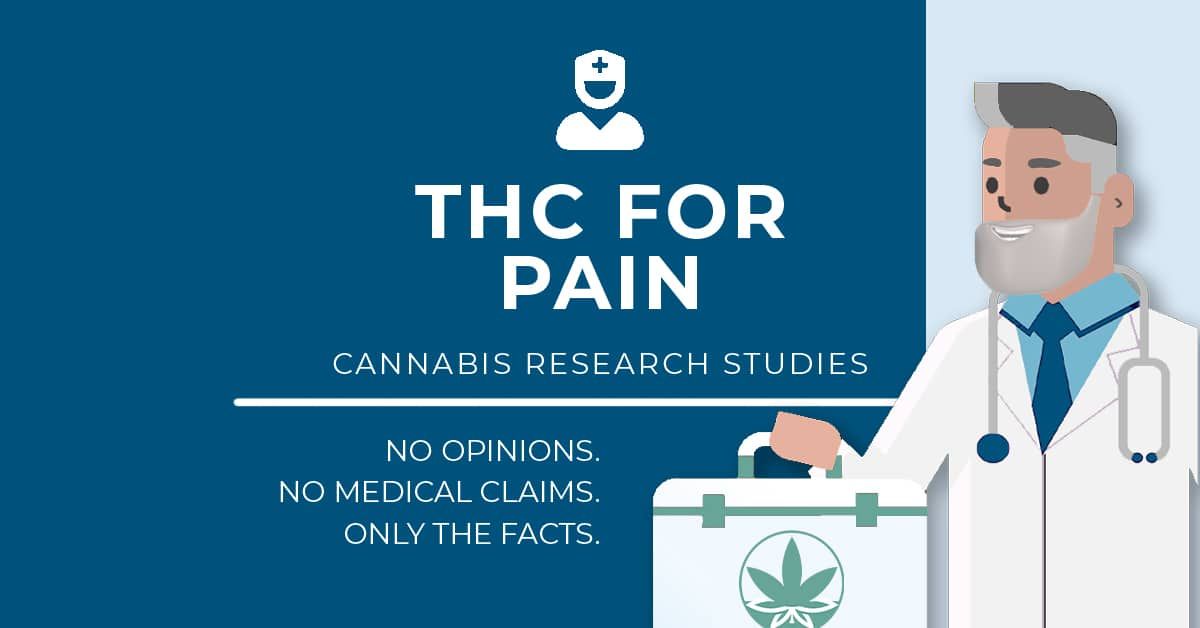THC Edibles For Pain


Christopher Visser
Multi-Cannabis Business Owner
Christopher Visser, the Founder and CEO of Cannabidiol Life and THCGummies.com, is a distinguished figure in the CBD industry, recognized for his pioneering contributions since 2016. With over 120 published articles, Christopher has become a reputable cannabis researcher, writer, and author. He's built two prosperous cannabis ventures that collectively generated millions in annual sales. His in-depth analysis of numerous cannabis studies, collaboration with medical professionals, and personal engagement with thousands of customers underline his expertise and commitment to advancing cannabis understanding daily.
-
 Written By:
Christopher Visser
Written By:
Christopher Visser
- Published:
- Updated: February 8, 2024
- Too Quiet, Light Up The Convo!
For centuries, cannabis has been used to help manage pain. In recent years, the growing acceptance and legalization of cannabis have allowed for more research into the therapeutic potential of different cannabinoids, such as delta-9 Tetrahydrocannabinol (∆9-THC). Tons of data show how THC might be a potent analgesic (pain reliever) and how it might be an alternative to opioids. Let's take a look at the studies, and we'll let you decide whether THC might effectively manage pain.
Table of Contents
What Is THC?
Tetrahydrocannabinol, better known as THC, is the most prevalent cannabinoid and chemical compound that is naturally derived from Cannabis-sativa plants. THC causes psychotropic and psychoactive effects when consumed.
If you wish to learn more, please check out our complete and comprehensive overview of THC by reading this article, What Is Tetrahydrocannabinol?
THC has shown that it might help consumers with pain control; however, this is not considered a medical fact.
Pain vs. Acute Pain vs. Chronic Pain
When discussing the potential benefits of using THC for pain relief, understanding the various types of pain is vital. The differences between pain, acute pain, and chronic pain are the length of time the pain is experienced and the level of pain intensity.
According to ClevelandClinic.org, Pain is your body’s way of alerting you that something isn’t functioning properly. Acute pain may come on suddenly and depart just as quickly; however, chronic pain lingers for six months, even after the initial cause has been diagnosed.
Now that the differences are clear let’s discuss how THC works in the body and why it might be a suggested alternative remedy.
How Does THC Work For Pain?
Your body has a biological management system known as the Endocannabinoid System, which produces natural cannabinoids that regulate various physiological functions, including pain. When you consume THC, it interacts with cannabinoid receptors in your brain and activates them.
This leads to an increase in neurotransmitters like dopamine, serotonin, and glutamate—all of which can help reduce inflammation and minimize the sensation of pain.
In addition to acting on the brain’s cannabinoid receptors, THC also acts on other types of receptors found throughout the body. Studies suggest that when combined with other compounds from cannabis plants like CBD or terpenes, THC can be even more effective at reducing pain.
For instance, one study found that when combined with CBD or CBG (Cannabigerol) extracts from cannabis plants, THC was able to reduce chronic neuropathic and inflammatory pain more effectively than either compound alone.
Efficacy of Combining THC and CBD For Pain
Tetrahydrocannabinol and Cannabidiol (CBD) are both used in medical cannabis for treating chronic pain because they are both notably referenced in clinical studies for their ability to lessen the pain intensity felt by people suffering from debilitating pain.
Here are a few studies that corroborate this:
The majority of critical reviews predating this study concluded that medical cannabis and cannabinoids with 1:1 ratios of THC:CBD offer a significant role in pain management.
This study suggests that using cannabinoids with a comparable THC-to-CBD ratio showed low to moderate evidence of reducing neuropathic pain.
THC in Pain & Chronic Pain Research: Clinical Studies & Their Results
Here are the specific pain-causing conditions where the use of Cannabis and THC research is most prevalent:
Chronic Pain
Neuropathy/Neuropathic Pain
Fibromyalgia Pain
Cancer-Induced Pain
Migraine Pain
Multiple Sclerosis
Let’s take a deeper dive into each one of these conditions so cannabis users and readers like yourself can have the links to the latest research.
I decided to offer this next section as a drop-down as there were so many recent studies, and I want you to have as many for your reference as possible.
THC Studies For Chronic Pain
Lynch, M. E., & Ware, M. A. (2015). Cannabinoids for the Treatment of Chronic Non-Cancer Pain: An Updated Systematic Review of Randomized Controlled Trials. Journal of neuroimmune pharmacology: the official journal of the Society on NeuroImmune Pharmacology, 10(2), 293–301. https://doi.org/10.1007/s11481-015-9600-6
Moreno-Sanz, G., Madiedo, A., Lynskey, M., & Brown, M. R. D. (2022). “Flower Power“: Controlled Inhalation of THC-Predominant Cannabis Flos Improves Health-Related Quality of Life and Symptoms of Chronic Pain and Anxiety in Eligible UK Patients. Biomedicines, 10(10), 2576. https://doi.org/10.3390/biomedicines10102576
Almog, S., Aharon-Peretz, J., Vulfsons, S., Ogintz, M., Abalia, H., Lupo, T., Hayon, Y., & Eisenberg, E. (2020). The pharmacokinetics, efficacy, and safety of a novel selective-dose cannabis inhaler in patients with chronic pain: A randomized, double-blinded, placebo-controlled trial. European journal of pain (London, England), 24(8), 1505–1516. https://doi.org/10.1002/ejp.1605
Abelev, S., Warne, L. N., Benson, M., Hardy, M., Nayee, S., & Barlow, J. (2022). Medicinal Cannabis for the Treatment of Chronic Refractory Pain: An Investigation of the Adverse Event Profile and Health-Related Quality of Life Impact of an Oral Formulation. Medical cannabis and cannabinoids, 5(1), 20–31. https://doi.org/10.1159/000521492
Romeyke, T., & Westfal, R. (2022). Integration of Cannabis Extract Tetrahydrocannabinol: Cannabidiol in an Interdisciplinary Therapy Setting: A Case of Chronic Multilocular Pain Disorder. Medical cannabis and cannabinoids, 5(1), 220–225. https://doi.org/10.1159/000527521
Henson, J. D., Vitetta, L., & Hall, S. (2022). Tetrahydrocannabinol and cannabidiol medicines for chronic pain and mental health conditions. Inflammopharmacology, 30(4), 1167–1178. https://doi.org/10.1007/s10787-022-01020-z
McDonagh, M. S., Morasco, B. J., Wagner, J., Ahmed, A. Y., Fu, R., Kansagara, D., & Chou, R. (2022). Cannabis-Based Products for Chronic Pain: A Systematic Review. Annals of internal medicine, 175(8), 1143–1153. https://doi.org/10.7326/M21-4520
Anand, U., Pacchetti, B., Anand, P., & Sodergren, M. H. (2021). Cannabis-based medicines and pain: a review of potential synergistic and entourage effects. Pain management, 11(4), 395–403. https://doi.org/10.2217/pmt-2020-0110
Petzke, F., Tölle, T., Fitzcharles, M. A., & Häuser, W. (2022). Cannabis-Based Medicines and Medical Cannabis for Chronic Neuropathic Pain. CNS drugs, 36(1), 31–44. https://doi.org/10.1007/s40263-021-00879-w
Bennici, A., Mannucci, C., Calapai, F., Cardia, L., Ammendolia, I., Gangemi, S., Calapai, G., & Griscti Soler, D. (2021). Safety of Medical Cannabis in Neuropathic Chronic Pain Management. Molecules (Basel, Switzerland), 26(20), 6257. https://doi.org/10.3390/molecules26206257
Henderson, L. A., Kotsirilos, V., Cairns, E. A., Ramachandran, A., Peck, C. C., & McGregor, I. S. (2021). Medicinal cannabis in the treatment of chronic pain. Australian journal of general practice, 50(10), 724–732. https://doi.org/10.31128/AJGP-04-21-5939
THC Studies For Neuropathic Pain
- This model revealed a definitive link between high THC concentrations or pure THC being the most productive for lessening the pain intensity.
- The findings of this 2022 study suggest that introducing a controlled combination of THC and CBD directly into the spinal cord could provide a reliable means for relieving neuropathic pain associated with nerve damage.
THC Studies For Fibromyalgia Pain
This study was published in 2021, and I believe the title speaks for itself: “Tackling the taboo: a sensible prescription for appropriate cannabis use in fibromyalgia.”
This study revealed that phytocannabinoids might be an economical and safe way to improve the quality of life for those afflicted with fibromyalgia. Further research is necessary to investigate the long-term effectiveness of treatment.
THC Studies For Cancer-Induced Pain
Cannabinoids have been demonstrated to provide great potential for relieving cancer-induced pain, bolstered by both preclinical animal studies and substantial observational research.
THC Studies For Migraine Pain
The data from this study indicate that oral cannabinoid preparations may offer a moderate degree of relief to those suffering from chronic migraine. However, further research is necessary.
Cannabis products derived from the Cannabis sativa L. plant have been demonstrated to be generally well-tolerated. Studies show that specific formulations from Cannabis-sativa L. have also been shown to be effective for headaches.
THC Studies For Multiple Sclerosis Pain
In a survey of more than 100 regular marijuana users with multiple sclerosis, nearly every participant reported that marijuana helped relieve spasticity and limb pain.
2020 critical review of ∆9 THC and CBD in MS Treatment
2022 Study on Cannabis & Cannabinoids For Symptomatic Treatment of MS
Approved Synthetic THC Pain Medications
This will be a quick section as I just want to give you the names of synthetic THC medications currently used for pain.
Marinol uses Dronabinol as the main ingredient. Dronabinol is made of pure synthetic THC.
Cesamet uses Nabilone as the main ingredient, almost purely synthetic THC.
Nabiximols was approved in 2010 in the UK, offering similar ratios of THC and CBD in spray form for under the tongue.
THC vs. Opioids: Which Is Better For You?
The opioid epidemic has forced many people to consider alternatives to prescription drugs like traditional opioid-based pain medications.
While much research is still needed in this area, some studies suggest that cannabis could be an effective alternative to opioids for managing certain types of pain.
One study found that patients who used cannabis had a 64% reduction in opioid use after just one week of treatment with medical marijuana products containing both CBD and THC (Tetrahydrocannabinol). This study also found that patients reported fewer side effects when using medical marijuana than prescribed opioids. This data suggests that medical marijuana may be safer than opioids for consumers needing some analgesic for chronic pain relief.
Mixing Hydrocodone & Acetaminophen With ∆9-THC
A recent 2-day study was published on August 22, 2022, discussing what happened to a 51-year-old white male after taking traditional paid medications with THC:
Day 1: The participant took Hydrocodone and Acetaminophen
Day 2: The participant took Hydrocodone, Acetaminophen, and Delta 9 Tetrahydrocannabinol
Here are the results.
On Day 2, the inclusion of cannabis resulted in a marked reduction of pain and anxiety symptoms. Furthermore, the pharmacokinetic analysis revealed that absorption rates had increased along with lowered plasma levels of hydrocodone – suggesting an augmented analgesic effect from adding cannabis to oral medication.
Risks & Potential Side Effects of Cannabis
It’s important to be aware of all potential side effects and the common adverse effects of THC. While most people have positive experiences with Tetrahydrocannabinol, there are still some long-term adverse effects that can happen if not used properly, along with the common short-term effects associated with the consumption of THC.
If you wish to explore all possible THC-related risks to make an informed decision about adding THC to your diet and your safety regarding cannabis products, please read our article on the side effects of THC gummies.
Possible Benefits of Taking THC For Pain
As someone who takes a keen interest in Tetrahydrocannabinol and its many uses, I’m fascinated by the potential benefits of THC. While much is still unknown about this controversial phytocannabinoid, with many people having strong opinions on it, more medical cannabis research and testing are starting to uncover evidence that suggests it might have important therapeutic effects.
The two main benefits of using THC for pain instead of synthetic opioids would be avoiding opioid addiction and its association with an annual increase in fatal overdoses.
My theory above is backed by this study that states how cannabis use could be a beneficial addition to treatment plans in helping patients cope with chronic pain symptoms and reducing reliance on pain medications.
For instance, in the United States, here are the reported death counts, which include the use of fentanyl:
In 2020, there were 68,630 deaths – source
In 2021, there were 71,000+ deaths – source
In 2022, there were 110,236 deaths – source
In a separate post, which you can find here, I covered some of the most promising possible benefits of THC, as highlighted through scientific clinical research studies and notable discussions from authoritative cannabis organizations conducting anecdotal research.
Buy THC Products For Pain Management Online or Get a Medical Marijuana Card: Pros & Cons
Are you considering buying THC edibles to help cope with pain but can’t decide whether to buy them online or get a medical marijuana card?
You’re not alone!
The debate over the “pros” and “cons” of using either option has been growing in recent years as more states have legalized the medical use of cannabis. Let’s explore both options in detail by addressing the accessibility, product quality, costs, and risks to help you make an informed decision.
Product Quality
Higher-quality cannabis products that have been tested for safety and potency and are held to the highest standards by third parties will be found in Medical Marijuana dispensaries.
Understanding the overall product quality from hemp-derived THC products online can be tricky for some states as the requirements to sell these products differ from one state to another, and the standards are not as high as medical marijuana.
Thus, I believe getting THC products for pain using a medical marijuana card will ensure that you always get the highest-quality products offering full panel third-party lab tests.
Cost-Effectiveness
When it comes to cost-effectiveness, buying THC products online has an advantage over getting a medical marijuana card in most cases since there are no registration fees associated with buying online (though prices may vary).
However, most states that allow medical marijuana require patients to register with the state government to access cannabis through licensed dispensaries which usually require an annual fee ranging from $50-$200, depending on the state.
Some states also impose taxes on all cannabis purchases made through licensed dispensaries, which can further drive up costs.
In regards to cost-effectiveness, buying THC products online is the clear winner.
Potential Risks
When comparing the potential risks associated with each option, getting a medical marijuana card is generally considered safer than buying THC products online since all product sold at licensed dispensaries is regulated and tested for safety and potency by third parties before the sale.
Further, you must be under the care of or approved by a licensed physician if you want a medical marijuana card; this lessons the risks of drug interactions and heightens the effectiveness of receiving proper healthcare.
On the other hand, when buying THC products online, consumers deal with mislabeled products, less medical oversight, and no guarantee that what is being sold to them is safe and effective. Also, buyers have little to no recourse if something goes wrong.
When comparing the potential risks, getting THC products via an MMJ card is the safer solution.
Accessibility
One year ago, when it came to accessibility, getting a medical marijuana card would’ve been the clear winner over buying THC products online. However, with the 2023 and growing hemp-derived THC edibles market, more options are available than ever, and consumers are becoming aware of these new options.
With a medical marijuana card, patients are subject to taking only the cannabis products available from licensed dispensaries in their state.
Therefore, in my opinion, in regards to being more accessible and more convenient, the winner would be buying THC gummies online.
Conclusion:
When it comes to managing chronic or acute pain without relying on potentially addictive opioids, there is no denying that medical marijuana and THC is a very attractive alternatives – especially when combined with other compounds from cannabis plants like CBD or terpenes.
Studies suggest that combining these compounds could make medical marijuana even more effective at reducing inflammation and minimizing pain sensation while having fewer side effects than traditional opioid-based medications.
The choice is yours. So, if you are looking for an alternative way to manage your chronic or acute pain without relying on potentially addictive opioids, THC may be worth considering. Before making your decision, we highly recommend talking to a licensed physician before altering your diet.

If this article sparked a new insight, pass the flame…
LET’S IGNITE RIPPLES OF CANNABIS WISDOM.
Be the catalyst for someone’s breakthrough moment.
SHARE ON SOCIAL MEDIA

Looking For Something Else?



